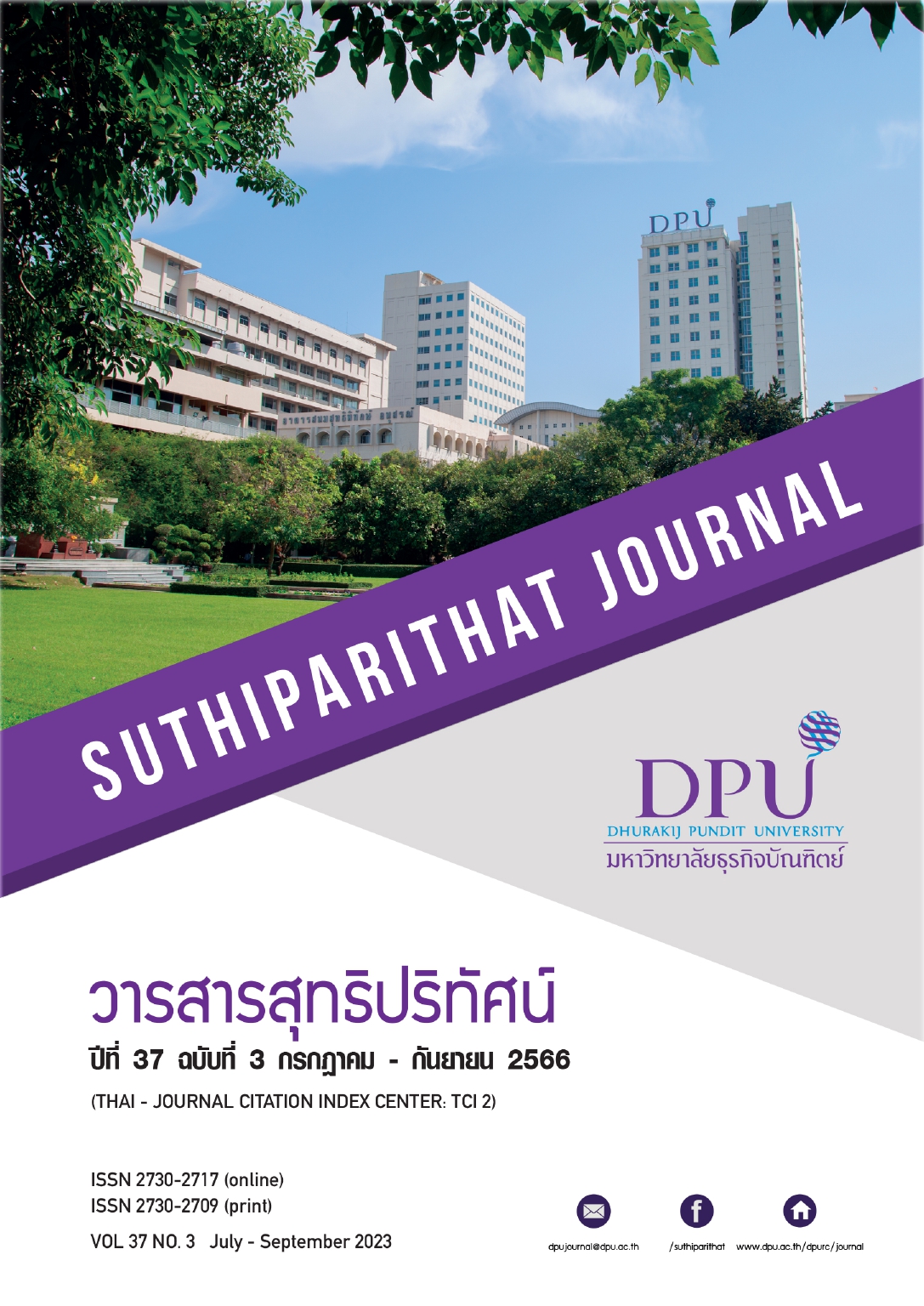SUCCESS FACTORS OF THE ENERGY BUSINESS AFFECTING SUSTAINABILITY : A CASE STUDY OF ENERGY BUSINESS IN THAILAND
Keywords:
Success Factors, Business Excellence Management, Ability to Create Business Value, Sustainability, Energy BusinessAbstract
The objectives of this research were: 1. to analyze the key components that contribute to the success factors of energy businesses, which impact sustainability, and 2. to examine the direct, indirect, and collective influences of management practices on business excellence and the ability to generate value-added for sustainable energy businesses in Thailand. The study employed in-depth interviews with top-level executives from six registered companies in the energy industry, in addition to survey questionnaires administered to employees from a simple random of energy business companies, totaling 350 respondents. The qualitative data were analyzed using factor analysis and structural equation modeling. The research yielded two main findings: Firstly, the components that impact the success factors of sustainable energy businesses were identified as organizational management for excellence, the ability to create value-added through energy business operations, and business sustainability. Effective business management and the development of a skilled workforce are crucial, but it is equally important for energy businesses to demonstrate a commitment to sustainable social development. Secondly, business excellence management has a positive direct influence on the ability to create business value with an effect size equal to .877 and a positive direct and indirect influence to business sustainability with a total effect size equal to .801 and the ability to created business value has positive direct influence on business sustainability with an effect size equal to .580 at a statistical significance level of .001.
References
กรรณิการ์ สิทธิชัย และ สันติธร ภูริภักดี. (2561). การจัดการองค์กรตามแนวคิด 7s ของ McKinsey ที่เอื้อต่อการเป็นองค์กรนวัตกรรม กรณีศึกษาองค์กรที่ได้รางวัลองค์กรนวัตกรรมยอดเยี่ยม. Veridian E-Journal, Silpakorn University ฉบับภาษาไทย สาขามนุษยศาสตร์และสังคมศาสตร์, 11(3), 1419-1435. https://he02.tci-thaijo.org/index.php/Veridian-E-Journal/article/view/156265
ชนภรณ์ อือตระกูล, สุจิตรา จรจิตร, และ วัน เดชพิชัย. (2562). องค์ประกอบและตัวบ่งชี้ภาวะผู้นำเชิงสร้างสรรค์ของหัวหน้ากลุ่มสาระการเรียนรู้ โรงเรียนขยายโอกาสทางการศึกษา ในจังหวัดชายแดนภาคใต้. วารสารมหาวิทยาลัยนราธิวาสราชนครินทร์ สาขามนุษยศาสตร์และสังคมศาสตร์, 6(1), 21-38. https://so05.tci-thaijo.org/index.php/pnuhuso/article/view/103743/120583
ตลาดหลักทรัพย์แห่งประเทศไทย. (2564). โครงสร้างการจัดกลุ่มอุตสาหกรรมและหมวดธุรกิจของตลาดหลักทรัพย์แห่งประเทศไทย. ผู้แต่ง.
นรินทร์ ตันไพบูลย์. (2564, 21 พฤษภาคม). แนวโน้มธุรกิจ/อุตสาหกรรม ปี 2564-2566: อุตสาหกรรมไบโอดีเซล. ธนาคารกรุงศรีอยุธยา จำกัด (มหาชน). https://www.krungsri.com/th/research/industry/industry-outlook/Energy-Utilities/Biodiesel/IO/io-biodiesel-21.
นลินี พานสายตา, ประวีณา คาไซ และ จตุพล จรูญโรจน์ ณ อยุธยา. (2561). กลยุทธ์การบริหารร้านอาหารและเครื่องดื่มแบบฟู้ดทรัคให้ประสบความสำเร็จ. วารสารวิทยาลัยดุสิตธานี, 12(2), 446-462. https://so01.tci-thaijo.org/index.php/journaldtc/article/view/126125
นัทวตรา ปัณชนาธรณ์ และ พรทิวา แสงเขียว. (2564). อิทธิพลของการกำกับดูแลกิจการที่ดีและความรับผิดชอบต่อสังคมที่มีต่อผลการดำเนินงานธุรกิจหมวดอุตสาหกรรมกลุ่มพลังงานและสาธารณูปโภคของบริษัทจดทะเบียนในตลาดหลักทรัพย์แห่งประเทศไทย. วารสารมหาจุฬานาครทรรศน์, 8(8), 77-89. https://so03.tci-thaijo.org/index.php/JMND/article/view/254269
พักตร์ผจง วัฒนสินธุ์. (2559). จริยธรรมและการบริหารธุรกิจ. จุฬาลงกรณ์มหาวิทยาลัย.
Ashu, S. (2013). A study of role of McKinsey's 7S framework in achieving organizational excellence. Organization Development Journal, 31(3), 39-50. https://www.proquest.com/docview/1467437673
Cabrilo, S., Nesic, L. G, & Mitrovic, S. (2014). Study on human capital gaps for effective innovation strategies in the knowledge era. Journal of Intellectual Capital, 15(3), 411-249. https://doi.org/10.1108/JIC-05-2014-0058
Colbert, A., & Kurucz, E. C. (2007). Three conceptions of triple bottom line business sustainability and the role for HRM. Human Resource Planning, 30(1), 21-29. https://www.researchgate.net/publication/235771844_Three_Conceptions_of_Triple_Bottom_Line_Business_Sustainability_and_the_Role_for_HRM
Dess, G. G., Lumpkin, G. T., & Eisner, A. B. (2008). Strategic management (4th ed.). McGraw-Hill.
Diamantopoulos, A., & Siguaw, J. A. (2000). Introducing LISREL: A guide for the uninitiated. Sage.
Engert, S., Rauter, R., & Baumgartner, R. J. (2016). Exploring the integration of corporate sustainability into strategic management: A literature review. Journal of Cleaner Production, 112, 2833-2850. https://doi.org/10.1016/j.jclepro.2015.08.031
Elliot, S. (2009). Developing organizational capabilities in SMEs: Enabling environmentally sustainable ICT. BLED 2009 Proceedings, 24, 236-249. http://aisel.aisnet.org/bled2009/24.
Hair, J. F., Black, W. C., Babin, B. J., & Anderson, R. E. (2010). Multivariate data analysis a global perspective (5th ed.). Pearson Education.
Kotler, P., & Keller, K. L. (2009). Marketing management (13th ed.). Pearson.
Lee, J., & Hsieh, C-J. (2010). A research in rating entrepreneurship, marketing capability, innovative capability and sustained competitive advantage. Journal of Business & Economics Research, 8(9), 109-119. https://doi.org/10.19030/jber.v8i9.763
Lie, D., Sudirman, A., Efendi, E., & Butarbutar, M. (2019). Analysis of mediation effect of consumer satisfaction on the effect of service quality, price and consumer trust on consumer loyalty. International Journal of Scientific and Technology Research, 8(8), 421-428. http://bitly.ws/Lgn5
Rodriguez Perez, J., & Ordóñez de Pablos, P. (2003). Knowledge management and organizational competitiveness: A framework for human capital analysis. Journal of Knowledge Management, 7(3), 82-91. https://doi.org/10.1108/13673270310485640
Schumacker, R. E., & Lomax, R. G. (2010). A beginners guide to structural equation modeling. Routledge.
Stiles, P., & Kulvisaechana, S. (2003). Human capital and performance: A literature review. The Judge Institute of Management, University of Cambridge. http://www.bus.tu.ac.th/usr/sab/articles_pdf/research_papers/dti_paper_web.pdf
Wang, L. (2005). A methodology of sustainability accountability and management for industrial enterprises. State University of New York at Buffalo.
Wong, W. P., Tseng, M., & Tan, K. H. (2014). A business process management capabilities perspective on organization performance. Total Quality Management & Business Excellence, 25(5-6), 602-617. https://doi.org/10.1080/14783363.2013.850812
Downloads
Published
How to Cite
Issue
Section
License
Copyright (c) 2023 Dhurakij Pundit University

This work is licensed under a Creative Commons Attribution-NonCommercial-NoDerivatives 4.0 International License.
Content and information of the article published at Suthiparithat Journal are based on the sole opinions and responsibility of author(s) only. Neither the editorial board involve in......







